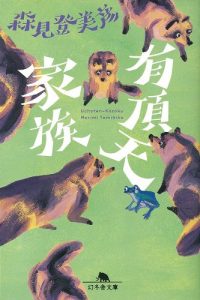Morimi has re-written five Japanese modern-classic short stories with his own twist. He recreates the stories with his specialty, college students in Kyoto, bringing in references from his earlier works such as The Night Is Short Walk on Girl.
I was thrilled to see that one of Morimi’s works is available on Audiobook.jp. This one is more challenging to understand than other audiobooks I have listened to because of some of the decorative phrasing used in descriptions, but even without 100% knowledge of some of the advanced vocabulary used, the stories are still understandable.
The Moon Over the Mountain
This first story of the collection one was my favorite. Not just for the story itself but for where it led me. This story was written by Nakajima Atsushi. I found that he wrote short stories in the early 20th century that are set in ancient China. I have been working on learning Chinese lately, and I have found learning about China from Japanese sources is quite rewarding. The original story is, although short, quite difficult to read, so I haven’t worked through it yet. Once I get to it, I’ll share my thoughts in another post.
Another neat aspect of this story is the incorporation of Daimonji Mountain, which shows up in many of Morimi’s works including The Tropics
In a Grove
This story is about a student in a university film-making club who creates a film featuring his girlfriend and her ex-boyfriend rekindling their love. It takes the perspective of several different characters describing the same situation.
The final narrator uses a lazy way of speaking, possibly with Kansai intonation—it’s hard for me to pick out accents in Japanese. It was difficult for me to understand, but with the many other descriptions of the same situation, I was better able to parse what he is saying. I have a very hard time understanding conversation, as opposed to something like an audiobook, which is relatively slow and deliberate. I think listening to the final narrator a few more times will be helpful for my listening comprehension of conversations, where you need to be able to understand a wide variety of speaking styles, which are not always clear and deliberate.
Run, Melos!
This feature story is also the most humorous and ridiculous. While the original, by Dazai, based on a Greek myth was probably not so humorous, peach-colored briefs play a prominent role in this updated version.
Under The Full-bloom Sakura Forest
This one had the least humor and seemed more serious to me. Quite possibly I’m missing humor if it is there though. I really liked the structure of this story, but I can’t give away the details.
One Hundred Ghost Stories
This is a great story to tie everything together. A mysterious character organizes an event where one hundred ghost stories are told, with one of 100 candles blown out after each story. When it becomes pitch dark, the real ghost is said to appear!
Final Thoughts
This work will probably be most enjoyable if you have read Morimi’s other older works that are based on university students in Kyoto, such as Walk on Girl The Night Is Young, Tatami Galaxy, and Tower of the Sun. I haven’t read the latter two, but I have a feeling I’m missing references from those works. Overall, this compilation of short stories is an enjoyable way to get some exposure to modern-classic short stories, all while never leaving Morimi-world, which has been fleshed out in his other works.
Image of Daimonji used under Creative Commons License
この短編集は5冊の古典文学作品をパロディーした物語にできています。森見先生のよくあるパターンで京大の大学生を通して物語を語れています。当作品中、夜は短し歩けよ乙女などの以前の森見作品のこともよく触れています。
当作家の作品はAudiobook.jpに一冊出ていると見て大変喜びました。たまに独特な言い回しが使われているので僕が聞いた他の作品よりやや聞き取りにくかったですが、語彙を100%わからなくても、なんとなくあらすじをついていけたと思います。
山月記
この短編集の中でこれは一番好きでした。作品そのもののためだけじゃなくて、導かれた道もその理由のひとつでした。原作の作家である中島敦を調べたところで、中国の古典を素材にして小説を書いていたと気づきました。僕は最近広東語を学んでいてその文化も学びたいと思っていますが、日本語の材料を使って中国のことを学ぶことは英語の材料を使うより深みがあると気づきました。日本語では地名や人命の漢字はそのまま使われていますし、中国のことを表現するには日本語の方がふさわしいという気がします。ちなみに、原作は漢語風な書き方で非常に読みにくいのでまだ読んでいないですが、読んだら感想をブログに投稿しようと思います。
他に面白いと思ったことは大文字山の登場でした。熱帯を含んで、森見先生の多くの作品に出ている名所で面白かったです。
藪の中
こちらは大学の映画サークル所属の学生の映画製作の事情についてです。監督と登場する男女の複雑な関係がいろいろな人の観点から語られています。
最後に出てくる語り手は少し早口で、もしかして関西のイントネーションで喋っているかもしれない—外国人の僕には訛りを見分けるのは難しいです。でもこの物語の形のかげで、最後の語り手が出てくる際、あらすじはすでに大体把握していましたから、言っていることもほとんど全部わかりました。
日本語の会話はオーディオブックに比べると僕にとって聞き取りにくいです。オーディオブックははっかり、ゆっくり語れていますが会話はそうでもないです。会話で使われているような日本語を慣れるため、この短編の最後の語り手を何回か聞いておきたいと思います。
走れメロス
これは表題作で一番おかしくて、笑わせられます。原作は太宰治の作品でその原作はギリシアの神話です。その二つの原作はこんなに軽くないと思います。森見先生版では桃色ブリーフは物語の中心にありますし。
桜の森の満開の下
これは一番真面目な短編でした。多分笑ってもいい部分がありましたが読み逃したかもしれないです。この話の形が好きでしたがネタバレしたくないですからこのへんにしておきましょう。
百物語
この短編は全部をまとめるには最適でした。謎の人物は独特なイベントを催します。幽霊話を100本語りながら、蝋燭を一本ずつ消していきます。最後の蝋燭が消されて真っ暗になったとき、本物の幽霊は現われるそうです。
最後に
この短編集を読む前に森見先生の他に京大生が出ている作品を読んだ方がいいと思います。例えば夜は短し歩けよ乙女や四畳半神話体系や太陽の塔。後者の二冊はまだ読んだことがないですが、読んでいないから見逃してる部分はないと思えないです。結局、これを読んで、森見ワルドを一歩も出ずに楽しく近代文学の名作に紹介してもらいました。
大文字山の写真はクリエイティブ・コモンズ・ライセンス






